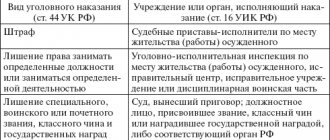- Concept and system of the Special Part of Criminal Law
- Qualification of crimes
This chapter formulates the concepts of the Special Part of the Criminal Code of the Russian Federation and its system, as well as the qualification of crimes, discusses the structure of the Special Part of the Criminal Code of the Russian Federation, its meaning, stages, principles of qualification (objectivity, accuracy and completeness), types of qualification, corpus delicti as a legislative model of qualification , special rules of qualification, as well as competition and conflict of criminal law norms, the socio-legal, criminological and moral significance of qualification is determined.
Concept and system of the Special Part of Criminal Law
A special part of criminal law is a set of rules, arranged in a certain order, establishing an exhaustive range of acts recognized as crimes and specific punishments imposed for their commission, as well as revealing the content of individual criminal legal regulations or providing for special types of exemption from criminal liability.
The system of the Special Part of the current Russian criminal law is understood as a classification of norms depending on the characteristics of the generic and specific objects of crimes and their location in the relevant sections and chapters, and within the chapters - in the articles of the Criminal Code of the Russian Federation.
RELATIONSHIP OF GENERAL AND SPECIFIC PART
Criminal law norms providing for punishment for certain types of socially dangerous acts, in their totality, form a Special Part of Russian criminal law.
If the norms of the General Part as a whole define the principles, grounds and limits of liability of persons found guilty of committing certain types of crimes, then the norms of the Special Part contain specific criminal law prohibitions and establish criminal penalties applied for their commission. The General and Special Parts constitute the unified criminal law of Russia, serving the tasks of protecting the rights and freedoms of man and citizen, property, public order and public safety, the environment, the constitutional system of the Russian Federation from criminal attacks, ensuring the peace and security of mankind, as well as preventing crimes.
The relationship between these parts of criminal law is manifested in the following:
- they are called upon to perform the same tasks provided for in Art. 2 of the Criminal Code of the Russian Federation;
- they are based on the same principles of criminal law, enshrined in Art. 3–7 of the Criminal Code of the Russian Federation;
- the norms of the General Part contain basic concepts for all criminal legislation; they are the basis for the implementation of the norms of the Special Part; the latter, in turn, fill the norms of the General Part with specific content;
- in the presence of circumstances excluding the criminality of an act that formally falls under the characteristics of a specific crime provided for by the Special Part, the provisions of the General Part are recognized as priority.
However, this does not detract from the relative independence of the Special Part of Criminal Law.
CONTENT OF SPECIAL PART
The norms of the Special Part directly outline the range of criminally punishable acts, contain an exhaustive list of criminal law prohibitions, and determine the types and amounts (terms) of punishment for their violation.
However, you cannot limit the content
Special part only by the mentioned circumstances. Prohibition norms, being dominant in this part of criminal law, do not exhaust its content as a whole. The subject of the Special Part also includes other norms, in particular definitional norms and incentive norms. The first of them reveals the relevant concepts and interprets individual criminal legal categories. So, in Art. 331 of the Criminal Code of the Russian Federation gives the concept of crimes against military service, outlines the scope of the norms of Chapter. 33 of the Criminal Code of the Russian Federation, determines the features of the punishability of these acts committed in wartime or in a combat situation. In the notes to Art. 201 and 285 of the Criminal Code of the Russian Federation contains a definition of a person performing managerial functions in a commercial or other organization, and an official. Notes to Art. 158 of the Criminal Code of the Russian Federation establishes the general concept of theft, reveals the essence of such criminal law categories as “significant size”, “large size” and “especially large size” of stolen property, “premises”, “storage”.
Incentive norms that stimulate post-criminal positive behavior of the guilty person provide for special types of exemption from criminal liability.
These include, for example, notes to Art. 126, 127.1, 204, 205, 205.1, 206, 208, 210 of the Criminal Code of the Russian Federation, etc.
Of course, incentive norms and definition norms do not reflect the essence of the Special Part, since they are determined not by the protective, but by the regulatory function of criminal law. But, being included in the “fabric” of the Special Part, these norms characterize the tendencies of Russian criminal law aimed at expanding the range of its capabilities and strengthening non-repressive principles.
The emergence of the Special Part of Criminal Law historically preceded the emergence of its General Part.
SPECIAL PART SYSTEM
The system of the Special Part of Criminal Law of the Russian Federation is the system of the Special Part of the Criminal Code of the Russian Federation of 1996, which differs significantly from previous codes. Firstly, the priorities of criminal law protection have been changed. The protection of the individual comes first, then society, and then the state.
Secondly, crimes are classified both by generic and by specific object. Crimes that are homogeneous in nature, essence, and social orientation are combined into six sections: crimes against the person; economic crimes; crimes against public safety and public order; crimes against state power; crimes against military service; crimes against the peace and security of mankind (in the criminal codes of many countries this chapter comes first, which more accurately reflects the social orientation and public danger of the crimes it combines).
The sections of the Special Part are, in turn, subdivided into chapters. This division is based on the specific object of the crime.
Within the chapters, crimes are classified according to their immediate object (crimes, as a rule, are arranged according to the principle “from more serious to less dangerous”).
In accordance with Art. 1 of the Criminal Code of the Russian Federation, new laws providing for criminal liability are subject to inclusion in the Criminal Code of the Russian Federation. This requirement also applies to criminal law provisions contained in the so-called comprehensive, cross-sectoral laws.
Criminal legislation provides for the possibility of adopting criminal law norms with a “limited period of validity”, which can act independently, without their inclusion in the Criminal Code of the Russian Federation.
So, in part 3 of Art. 331 of the Criminal Code of the Russian Federation establishes that criminal liability for crimes against military service committed in wartime or in a combat situation is determined by the wartime legislation of the Russian Federation. “Wartime” legislation operates “autonomously”, without incorporation into the Criminal Code of the Russian Federation, but only during the specified period.
In general, criminal law, as is known, is based on the Constitution of the Russian Federation and generally accepted principles and norms of international law. However, this provision does not apply to establishing the range of criminal offenses. The rules of criminal law contained in international treaties and conventions cannot be applied directly; they must be implemented into domestic criminal legislation.
SIGNIFICANCE OF THE SPECIAL PART
The significance of the Special Part of Criminal Law lies primarily in the fact that its norms:
- ensure protection of the most important public relations;
- substantively embody the principle of legality (criminality and punishability of an act are determined by the norms only specified in it; the use of analogy is not allowed);
- ensure the implementation of the state’s criminal policy;
- contain a description of specific types of crimes, which makes it possible to qualify socially dangerous acts;
- allow the classification of crimes depending on the nature and degree of public danger into basic, qualified and especially qualified types, which makes it possible to differentiate the responsibility of the guilty person.
The system of the Special Part of Criminal Law does not coincide with the course system of the Special Part of Criminal Law. The latter is much broader; its subject covers not only the corresponding system of norms, but also other elements: the scientific classification of crimes; history of legislative development; research of legislation of foreign countries; studying the social conditioning and effectiveness of norms on individual crimes, etc.
Title VII (Ch. 16–20) – crimes against the person
Section VII
(chap. 16–20)
– crimes against the person.
These crimes encroach on such inalienable individual rights as life and health (Chapter 16).
To attacks on life
The new Criminal Code includes: a) murder (Article 105); b) murder by a mother of a newborn child (Article 106); c) murder in a state of passion (Article 107); d) murder committed when the limits of necessary defense were exceeded or when the measures necessary to detain the person who committed the crime were exceeded (Article 108); e) causing death by negligence (Article 109); f) incitement to suicide (Article 110).
To attacks on health
the law includes: intentional infliction of grievous bodily harm (Article 111); intentional infliction of moderate harm to health (Article 112); causing grievous or moderate harm to health in a state of passion (Article 113); infliction of grievous or moderate harm to health by exceeding the necessary defense or by exceeding the measures necessary to detain the person who committed the crime (Article 114); intentional infliction of minor harm to health (Article 115); beatings (Article 116); torture (v. 117); causing grievous or moderate harm to health through negligence (Article 118); threat of murder or causing grievous bodily harm (Article 119); coercion to remove human organs or tissues for transplantation (Article 120); infection with a venereal disease (Article 121); HIV infection (Article 122); illegal abortion (Article 123); failure to provide assistance to a patient (Article 124); leaving in danger (Article 125).
Chapter 17 combines crimes against freedom, honor and dignity of the individual.
The Constitution of the Russian Federation establishes the rights and freedoms of man and citizen. Part 1 art. 22 of the Constitution of the Russian Federation provides that every citizen has the right to freedom and personal integrity,
and part 1 art.
23 of the Constitution of the Russian Federation enshrines the human right to privacy , personal and family secrets,
protection of one’s
honor and good name.
Personal dignity is protected by the state.
In ch. 17 of the Criminal Code there are a number of articles that establish criminal liability for attacks on freedom, honor and dignity of the individual. Thus, an infringement on personal freedom is provided for in Art. 126 (kidnapping), 127 (unlawful imprisonment), 128 (illegal placement in a psychiatric hospital); for honor and dignity - Art. 129 (libel) and 130 (insult).
Crimes against sexual integrity and sexual freedom of the individual
are combined in ch. 18 of the Criminal Code. Sexual crimes are deliberate actions against sexual integrity and sexual freedom protected by criminal law, as well as the moral and physical development of minors and causing harm to specific individuals.
Crimes against public safety and public order
Title IX
(Ch. 24–28) The Criminal Code considers
crimes against public safety and public order.
The priority of the person, his inalienable rights and freedoms makes it necessary to comply with the rules of society, ensure public safety and public order, protect public health and public morality, comply with the norms and rules for handling sources of increased danger and their use, in particular vehicles (all types), lawful use of achievements of science and technology, including computer programs and computer information. With all the diversity of these interests, they are directly or indirectly related to the safety of people, with the observance of public order and public morality. Environmental crimes, among other things, pose a direct threat to the safety of people and their normal existence. Therefore, attacks on the above-mentioned interests are reasonably included in this section of the Special Part of the Criminal Code.
Chapter 24 of the Criminal Code “Crimes against public safety”
combines crimes whose object is public safety - a set of social relations that ensure safe living conditions for people and their activities, the safe use of radioactive substances, the proper and safe use of weapons, ammunition and explosives, as well as the safe conduct of mining and construction work.
These include such serious crimes as terrorism (Article 205); hostage taking (Article 206); knowingly false report about an act of terrorism (Article 207); banditry (Article 209); hijacking of an air or water transport vessel or railway rolling stock (Article 211); hooliganism (Article 213); vandalism (Article 214), etc.
To Chapter 25 of the Criminal Code “Crimes against public health and public morality”
These include those crimes that cause significant damage not only to the moral and physical health of the population, but also to the rational use of the natural environment, historical and cultural heritage.
Thus, crimes against public health include: theft or extortion of narcotic drugs or psychotropic substances (Article 229); organizing or maintaining dens for the consumption of narcotic drugs or psychotropic substances (Article 232), etc.
Crimes against public morality include: involvement in prostitution (Article 240); illegal distribution of pornographic materials or objects (Article 242); destruction or damage to historical and cultural monuments (Article 243); cruelty to animals (Article 245), etc.
In Chapter 26 “Environmental Crimes”
For the first time, crimes encroaching on public relations for the protection of a qualitatively favorable natural environment, the rational use of its resources and ensuring the environmental safety of the population have been combined. The subjects of such crimes are air, water, land, forests and other natural resources. Environmental crimes are: pollution of water, atmosphere, marine environment (Articles 250, 251, 252); violation of rules for the protection of fish stocks (Article 257); illegal hunting (Article 258); destruction or damage to forests (Article 261), etc.
Chapter 27 of the Criminal Code includes crimes against traffic safety and transport operation.
These crimes are highlighted in a separate chapter for the first time. The crimes of this chapter encroach on a single generic object, which is social relations that ensure the safe operation (movement and operation) of various vehicles. For example, violation of traffic safety rules and operation of railway, air or water transport (Article 263); rendering vehicles or means of communication unusable (Article 267), etc.
Chapter 28 of the Criminal Code of the Russian Federation is the first experience of domestic criminal legislation on computer crimes.
It provides for liability for
crimes in the field of computer information:
unlawful access to computer information (Article 272), creation, use and distribution of malicious computer programs (Article 273), violation of the rules for operating computers, computer systems or their networks (Article 274 ). Computer crimes infringe on the information security of others' rights and interests in relation to automated data processing systems and thereby cause significant harm to the individual, society or state.
Crimes against state power
Section X
(Chapter 29-32) The Criminal Code
“Crimes against state power”
includes: crimes against the foundations of the constitutional order and security of the state (Chapter 29); crimes against state power, the interests of civil service and service in local governments (Chapter 30); crimes against justice (chapter 31); crimes against the order of government (chapter 32).
The named crimes encroach on the system of social relations that ensure the legitimacy and normal functioning of state power in the Russian Federation, i.e. social relations that ensure the protection of the foundations of the constitutional and state system, the normal activities of government bodies belonging to various branches of government, as well as the interests of public service and service in local governments.
The most dangerous of the crimes included in this section are crimes against the foundations of the constitutional order and state security
(Chapter 29), since they affect the foundations of the social, political and state system of the Russian Federation, its sovereignty, external and internal security.
The group of crimes under consideration can be classified into the following types:
crimes against the external security of the Russian Federation:
high treason (Article 275), espionage (Article 276);
attacks on the political system of the Russian Federation:
encroachment on the life of a statesman or public figure (Article 277), violent seizure of power or forcible retention of power (Article 278), armed rebellion (Article 279), public calls for a violent change in the constitutional system of the Russian Federation (Article 280);
encroachment on the economic security and defense capability of the Russian Federation
- sabotage (Article 281);
encroachment on the constitutional principle of prohibiting propaganda or agitation that incites social, racial, national or religious hatred or enmity
(Article 282);
crimes encroaching on the safety of state secrets
(vv. 283, 284).
Crimes against state power, interests of civil service and service in local government bodies
(Chapter 30) pose an increased danger due to the fact that these crimes are committed by government officials themselves.
The peculiarity of this group of crimes is expressed in the following characteristics: they are committed either with the use of official powers,
or
due to the official position held by the offender and contrary to the interests of the service
- abuse of official powers (Article 285), taking a bribe (Article 290), official forgery (Article 292), etc.
Crimes against justice
(Chapter 31) include intentional criminal acts that impinge on the normal functioning of the justice system. In this case, justice is understood in the broad sense of the word, i.e. as the activities of special bodies with power functions, which, on behalf of and on behalf of the state, enter into legal relations with citizens and legal entities within the framework of criminal or civil proceedings. These include courts of all levels, prosecutors, investigations, inquiries, operational investigative structures of the Ministry of Internal Affairs, FSB, and tax police.
Depending on the subject
There are three types of crimes:
1) crimes committed by justice workers
when performing the functions assigned to them: bringing a knowingly innocent person to criminal liability (Article 299); unlawful arrest, detention or detention (Article 301); illegal exemption from criminal liability (Article 300);
2) crimes committed by persons against whom measures of legal coercion were applied:
escape from places of imprisonment, from arrest or from custody (Article 313) and evasion from serving imprisonment (Article 314);
3) crimes committed by persons obliged by law or by virtue of civic duty to promote justice and not interfere with its implementation:
obstruction of justice and preliminary investigation (Article 294); knowingly false testimony, expert opinion or incorrect translation (Article 307), etc.
Crimes combined in ch. 32 of the Criminal Code, encroach on specific types of public administration:
on the inviolability of the State border of the Russian Federation (Articles 322,323); on the procedure for circulation of official documents and state awards (Articles 324–327); on the procedure for conscription into military and alternative civilian service (Article 328); on the authority of the State Emblem and State Flag of the Russian Federation (Article 329), etc.
Economic crimes
In Section VIII
are combined
:
crimes against property (Chapter 21); crimes in the sphere of economic activity (chapter 22); crimes against the interests of the service in commercial and other organizations (Chapter 23).
What these chapters have in common is that all these crimes are aimed at the totality of social relations that ensure the normal functioning and development of the Russian economy, and cause significant harm to it.
The Criminal Code of the Russian Federation of 1996 finally equalized all forms of property as objects of criminal legal protection and established equal limits of punishment for the same attacks on any of them.
Chapter 22 of the Criminal Code “Crimes in the field of economic activity”
contains legal provisions on liability for previously unknown crimes in the economic sphere. For example, illegal entrepreneurship (Article 171), illegal banking activities (Article 172), false entrepreneurship (Article 173), legalization (laundering) of money or other property acquired illegally (Article 174), illegal receipt of a loan (Article 176), fictitious bankruptcy (Article 197), etc.
The norms of Ch. 23 of the Criminal Code “Crimes against the interests of service in commercial and other organizations”
the correct exercise of powers by persons who are not employees of state bodies, local governments, state and municipal institutions is protected. These include crimes such as: commercial bribery (Article 204), abuse of power by employees of private security or detective services (Article 203), abuse of power by private notaries and auditors (Article 202), etc.
The establishment of criminal liability for these and similar crimes is due to the fact that the management of other people's property (previously a function of government bodies) today is increasingly the function of a private person acting on the basis of a contract (for example, the function of a director, commercial representative).








